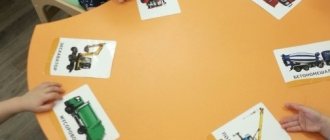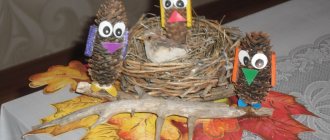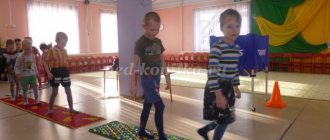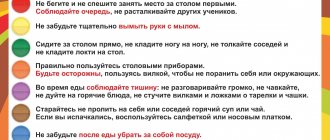Distant relatives
In addition to grandparents, there are other relatives.
- Relatives - relatives (applies to all relatives).
Aunt ['ɑ:nt] [a:nt] - aunt, uncle ['ʌŋkl] [ankl] - uncle. Their children are designated by the word cousin. Cousin ['kʌzn] [treasury] is translated in two ways: cousin/cousin. It can be used in the plural. Bob is my cousin . Lena and Kate are my cousins .
In Russian we call the children of our brother or sister “nephew” or “niece”. In English it sounds nephew ['nevju:] [newu] - nephew, niece ['ni:s] [ni:s] - niece.
Godparents and godchildren:
- Godfather - godfather [ˈgɒdfɑːðə] [godphase]
- Godmother - godmother [ˈgɒdmʌðə] [godmaze]
- Godson - godson [ˈgɒdsʌn] [godsan]
- Goddaughter - goddaughter [ˈgɔddɔːtə] [goddo:te]
Another group of words:
When we describe relatives of a husband or wife, we add - in law , [in lɔ:] [in lo:], which literally translates “in law” or “according to the law.”
- Brother in law - brother of husband, wife. Notice how much easier it is than in Russian. Since in Russian it is called brother-in-law and brother-in-law.
- Sister in law - sister of a husband or wife. In Russian there are names for them - sister-in-law and sister-in-law.
- Mother in law - mother of a husband or wife, in Russian mother-in-law and mother-in-law.
- Father in law - father of a husband or wife, in Russian father-in-law or father-in-law.
- Son in law - son-in-law.
- Daughter in law - daughter-in-law.
If we want to say that he or she is married, we use the expression to be married [tuː biː ˈmærɪd] [tu bi marid]: My brother is married . — My brother is married . Her sister is married . — Her sister is married .
Saying that he/she is divorced, we use the expression to be divorced [tuː biː dɪˈvɔːst] [tu bi marvel:st]: My aunt is divorced . — My aunt is divorced .
Another word that may be useful to you is bachelor [ˈbæʧələ] [bechele] - bachelor: My cousin is a bachelor . — My cousin is a bachelor .
If we want to say that a woman is not married, we must say: She is unmarried .
If a girl and a guy meet, we talk about them: boyfriend/girlfriend.
Young people who are going to get married:
- fiance - [fi'ɑ:nsei] [fiansey] - groom
- fiancée - [fi'ɑ:nsei] [fiansey] - bride
'fee-yon-say' - similar to the name of the singer Biense. Americans pronounce these two words [fɪˈænsɪ] [fiency].
- His fiancée and he will be married in September. — His fiancee and he will get married in September.
In Russian, “bride and groom” sound the same before the wedding in the registry office and after during the wedding they are still “bride and groom”. In the English, after the moment of marriage, they are called differently: a bride [braɪd] [bride] - the bride (newlywed) and a bridegroom [ˈbraɪdgrum] [bridegroom] or simply a groom - the groom (newlywed).
This is interesting: In the UK there is a law - once every 4 years during a leap year, women are allowed to ask for the hand of the young man they like. This year, such an act is not considered something immoral and reprehensible. Previously, they did this using special postcards.
Relationship history
| adop - to adopt, adopt |
| adult / grown-up - adult |
| ancestor - ancestor |
| bachelor - bachelor |
| baptize - to baptize |
| be engaged - to be engaged |
| be in love - to be in love |
| be married to - to be married to, to be married to |
| be pregnant - to be pregnant |
| birthday - birthday |
| born - born |
| bring up / raise - to bring up |
| couple - couple (married) |
| descendant - descendant |
| divorced - divorced |
| expect a baby - expect a child |
| fall in love - fall in love |
| give birth to (somebody) - give birth to (someone) |
| go to school - go to school |
| guardian - guardian, trustee |
| marry / get married - to marry, to get married |
| orphan - orphan |
| spinster - old maid, unmarried woman |
| teenager - teenager |
| wedding - wedding |
| widow - widow |
| widowed - widowed |
| widower - widower |
| youth - young man, young man / youth, youth |
Basic Rules
Proper names are used without articles. But if this is a collective name of a family, then they put the article the.
- Ann Brown is a pupil.
- The Browns like tea. (Referring to the whole Brown family)
Words denoting your relatives are preceded by the article a/an .
- I have a sister, a brother, an aunt.
Mother, Father are written with a capital letter and without an article if they are relatives of the speaker.
- Father is still away. - Dad's still not here.
- Mother is cooking now. — Mom is cooking now.
When mentioning someone's relatives, they use a possessive pronoun.
- Your sister Mary is a smart girl. “ Your sister Mary is a smart girl.”
Story in English my family
My family or about my family
My name is Alexander. I am 13 years old and I live in a happy family, which consists of my mother, father and my younger brother Oleg, who is eight years old. My dad Vladimir is an electrician and works at a factory. He installs electric motors for factories. The job is not bad I think, but my dad always reminds me to study better so that I can get another job when I grow up. My mother Natalia works in a supermarket, this is a useful job because she gets discounts on products and brings home delicious candies and chocolate, sometimes new computer games that Oleg and I have never played before.
Oleg, my brother, is quite funny. He's very smart and really likes to draw, which is good, but lately he's been a bit of a problem, wanting to play my games on dad's laptop. This sometimes leads to quarrels, and my mother constantly tells me that I should share more with Oleg. I like to meet my friends in the park after school. We practice with our skateboards, doing tricks. However, every day I have to pick up my brother and take care of him, which means I have to also take him to the park with me. It's great, but he wants to do the same tricks as me and my friends, but he's too small and sometimes he knocks his knee out or hurts himself, and mom of course punishes me when that happens and she says I'm not should allow Oleg this. But I'm proud of what he does. No other eight year old in the area can match him, I'm sure!
I love visiting my grandparents in the village. They are interesting people and always tell me exciting stories. My favorite thing is when we take our tent and go to the forest nearby and set up camp. Dad makes barbecue from meat and fish, and mom brings food from grandma in saucepans. We play football and other games in the daytime. At night, dad plays the guitar and we sing songs around the fire. Mom, dad, me, and Oleg. I like my family; life is wonderful!
How to make the Family theme not only understandable, but also loved by your child?
Hello my dear.
Did you know that in Chinese, maternal grandmother and paternal grandmother are two different words and two completely different sets of characters? It’s good that in English everything is much simpler regarding family! Although, knowing from experience, the topic of family in English for children turns out to be some kind of incredible problem.
Want to make this process a lot easier? Today I will help you with this! We will get acquainted with vocabulary on the topic “family”, a couple of stories in English, as well as interesting ways to make studying this topic much easier.
Phonetic exercise (practicing sounds [ð]-[θ])
Today I want to tell you a fairy tale about two bees: English and Russian. One day a Russian bee was sitting on a flower. An English woman wanted to sit on the same flower. The Russian did not give up her place, and she began to swear: s-z-z-z-z! The little bee from England is not inferior to her and also swears. Her tongue is long and does not fit in her mouth. Like this: th-th-th-th-th! How did the Russian bee buzz? - z-z-z-z-z. - What about English? - th-th-th-th (3-4 times).
Russian says - [za-za-za], and English - (children repeat after the teacher) [ða-ða-ða]. Russian is [ze-ze-ze], and English is [ðe-ðe-ðe]. Russian is [zi-zi-zi], and English is [ði-ði-ði].
They swore like this all day, and by the evening they were tired, their voices were hoarse, but they still continued to argue: Russian - [sa-sa-sa], and English - [θа-θа-θа]. Russian is [si-si-si], and English is [θi-θi-θi].
Notes:
Human, Man, Human being
Human is a person as a representative of the human race. Man is a person in the ordinary, everyday sense, “someone from the crowd” (in another meaning: a man). There is also the phrase human being - a human being, a representative of the human race in a more sublime sense.
Read more in the article: “The difference between Man, Human, Human Being, Person, People.”
Man, woman, children
These three words belong to a small group of nouns that form their plurals in a special way:
- man-men,
- woman – women,
- child – children .
Let's start learning vocabulary
Children love their family. They do it with pleasure. This is the age when they easily remember information. But psychologists believe that the threshold for forgetting is 3 days. That is, you need to practice regularly in order to see results.
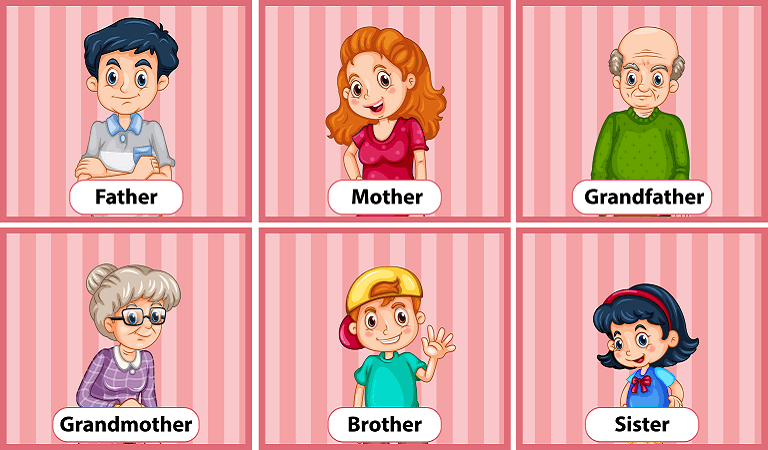
We work with kids using pictures, videos, and cartoons. First, show a picture, it could be a family photo, and voice the image. Let your child repeat after you several times. Due to their age, they still cannot read. In any case, first the picture, then the word.
Flashcards and workbook
We recommend dividing words from the topic “Family” into two lessons. If you have the opportunity, print out cards and workbooks, you can work with them in any way, the more fun and dynamic, the better

